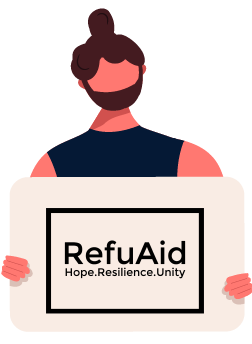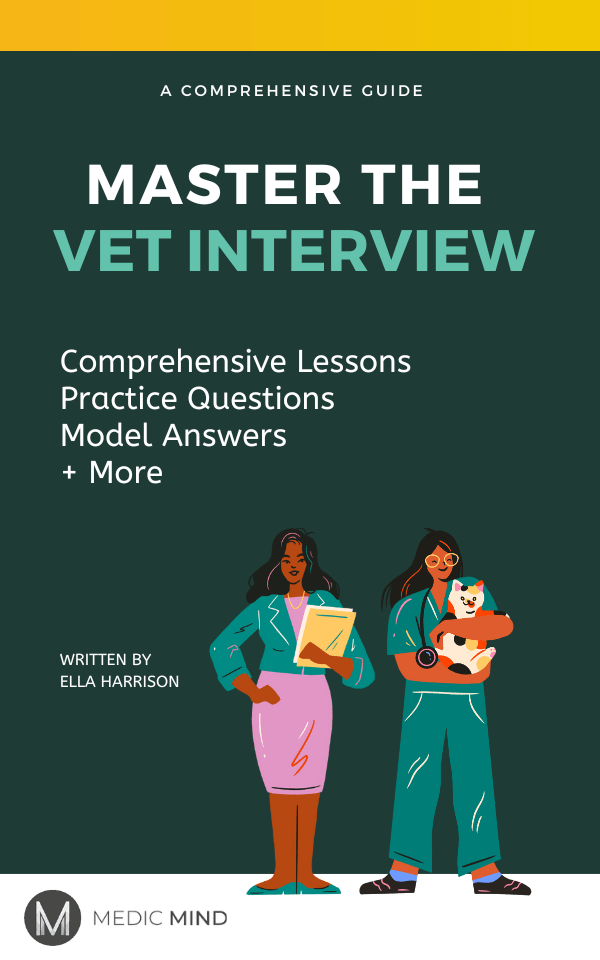Get into Vet School 2023
Veterinary Interview Tutoring
Veterinary Interview Tutoring
Don't take a chance on your place at Vet school. Get onto the vet course you want with help from us.
GET STARTED- Personalised to You
- 93% Success Rate
- Trusted by 6,000+ Students
- First Lesson Satisfaction Guarantee




 reviews
reviews

Book call with Vet Interview Expert
Let’s secure your vet offer
- Personalised teaching
- University Specific
- First Lesson Satisfaction Guarantee
- 93% Success Rate

Expert
Coaching
24/7
Support
MMI, Panel
& Oxbridge
Talk to us
within 21 seconds
It's no secret that vet interviews will be competitive this year, get an advantage today by contacting our team!
How Vet Mind’s 1-1 Tutoring works
Vet interview preparation can be scary –
3 applicants to 1 place makes this the
most competitive hurdle.

How Vet Mind’s 1-to-1 Tutoring works

Your time is valuable.
So we’ve summarised it for you!
How can we improve you?
-
Increase your confidence
Learn how to articulate yourself, perfecting your language, tone, posture and mannerisms
-
Know what’s good and bad
Breakdown the strengths of model answers and weaknesses of poor ones, to help build your unique responses
-
Develop answers with depth
Want to avoid the cliché? Tutoring can show you how to create personalised and genuine answers to the big Qs
-
University-specific guidance
Tailor your response to your university by learning what they want - we have model answers to 20+ veterinary schools

Why choose Vet Mind?
Official UK Government Education Partner
Our vet interview preparation course is designed by experts who have excelled in veterinary applications and is proven to be successful.
SATISFACTION RATE
98.9%
HOURS TAUGHT
134,000+
UNIVERSITY SUCCESS
93.4%
First Lesson Satisfaction Guarantee
Tutoring can be a big investment, we know that. That's we offer a Money Back Guarantee on your 2 hour trial first lesson if you aren't satisfied.

So why wait?
Start your journey now!
Speak to one of our tutors and arrange your first interview tutoring session within minutes. It’s really is that easy!
Our Proven 4 Steps to Success
Step 1
Model Answers
THEMES
MOTIVATION FOR VETERINARY MEDICINE

WORK EXPERIENCE

PERSONALITY
Building Model Answers
We will build bullet-point model answers with you for the most common interview questions. With our help, your answers will come across as structured and natural, without sounding rehearsed.
Personal Interview Handbook
You receive a personal vet interview preparation handbook which we work through together, filling in model answers.
Step 1
Model Answers

Step 2
Core Knowledge
THEMES

VET ETHICS

PRIORITISATION

ANATOMY
Discussing Veterinary Ethics
Prioritisation
Step 2
Core Knowledge

Step 3
Interview Etiquette
THEMES
TONE AND EXPRESSION
DOS AND DONTS
STRUCTURING ANSWERS
Interview Etiquette
We’ll start to pick out things in your posture, your tone and your answer structure, to help you perfect your interview technique.
Perfecting Technique
We will show you how to articulate yourself well and how to deal with difficult MMI stations. By this stage, you should start to feel ready for interview day.
Step 3
Interview Etiquette

Step 4
Mock Interviews
THEMES
UNIVERSITY MMI MOCKS
MMI MOCKS BY TOPIC
PANEL MOCKS
University MMI Mocks
We have an individual MMI mock for each university, built using insider university information and research. From feedback, this is our most popular Vet Mind resource across all our courses!
University Specific Tutorials
We have specialist research banks and specific tutorials for each university. If you’re applying to Leeds, we’ll teach you the specifics of their course, the culture, the university and the interview style.
Step 4
Mock Interviews

Our students love us, but don’t
just take our word for it:
Our Reviews



We’re here to lock in
your vet med offer.
CHECKLIST
- Unique MMI Mocks for each of 10+ Vet Schools
- Exclusive insider info from past students
- Extensive question bank covering Panel interviews
Motivation for Veterinary Science
Here we tackle the common interview questions on “Why Veterinary Medicine?” – Vet schools want to know why you are applying for veterinary medicine and what your reasons are for it. Do you have a personal story? Are you just really interested in animals? There is no right answer, but it’s all about showcasing your passion for the subject.
Tutorials
Lesson 1
Why Vet Med?
In this first tutorial we explore some of the reasons why you’re applying for veterinary science and how to formulate your answer. We will also go through model answers and come up with a perfect one for your interview handbook
Lesson 2
Being a Vet
Being a vet can be tricky, and vet schools want to ensure you have sufficient insight into the profession. Here we will explore some of the pros and cons of being a vet and how you can display that you understand it well.
Lesson 3
Veterinary Specialties
You may get asked where you want to specialise in the future – Don’t worry if you don’t know it’s okay! It’s important however to be aware of the different specialties in veterinary science and talk about the specialty in which you did your work experience.
Lesson 4
Non-Clinical Roles of Vets
Being a vet is so much more than just getting animals better. We explore some of the non-clinical roles here such as teaching, running a practice and more.
Lesson 5
The Multidisciplinary Team
MDT is a buzz-word used a lot but what does it actually mean? What are the different roles in a veterinary system – How will you get along with other veterinary professionals such as veterinary nurses.
Lesson 6
MMI Practice 1
Let’s put our work to practice with real MMI scenarios. We will go through these together with you and show you step-by-step the best way of tackling them. The benefit here is the real insight you get from tutors who have been on the other side of the interview before!
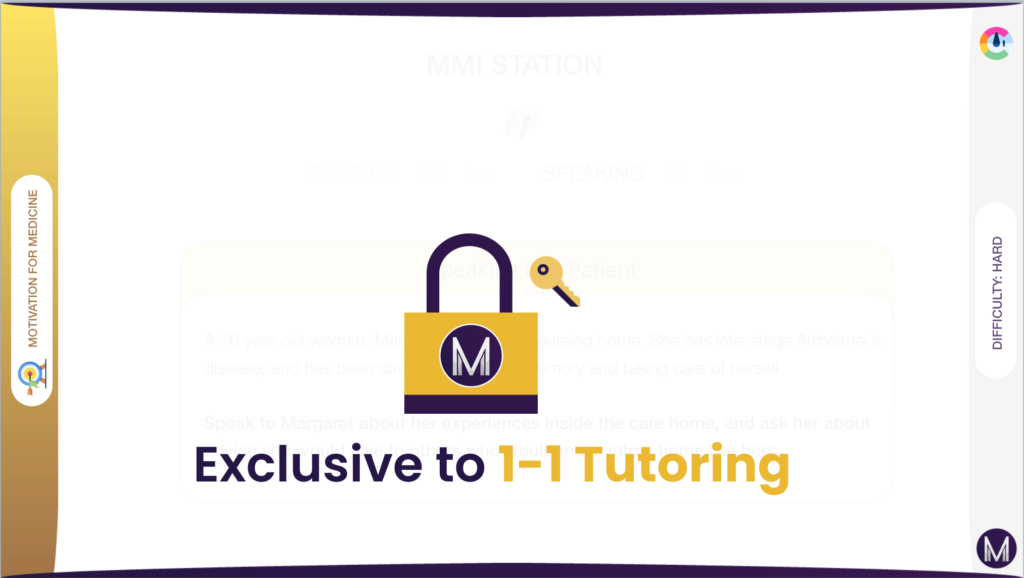
Lesson 7
MMI Practice 2
Let’s put our work to practice with real MMI scenarios. We will go through these together with you and show you step-by-step the best way of tackling them. The benefit here is the real insight you get from tutors who have been on the other side of the interview before!

Lesson 8
MMI Mini Mock 1
You’ll dive into the deep end with mocks! You’ll have a go at the station which we will record and then watch back together analysing areas you did really well and areas you need to work on!

Lesson 9
MMI Mini Mock 2
You’ll dive into the deep end with mocks! You’ll have a go at the station which we will record and then watch back together analysing areas you did really well and areas you need to work on!

Personality & Skills
One of the main reasons vet schools have interviews is they want to see what sort of vet you will make which is often hard to tell from aptitude tests and A-Levels. Here we will show you how to display your compassion, empathy and organisation skills which will make you a perfect vet.
Tutorials
Lesson 1
Skills and Qualities
Using Medic Mind’s 5 steps, you will be able to answer several personality questions using the same answers! It will also enable you to come across confident and coherent and be able to showcase the wide array of skills you have.
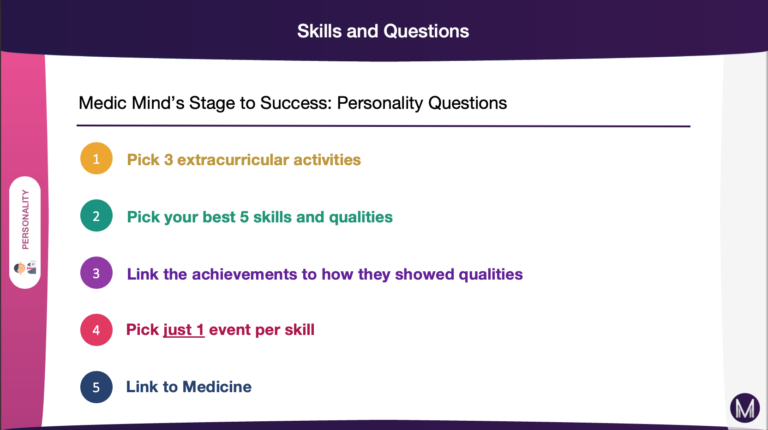
Lesson 2
Inspiration and Emotion
Here we explore the classic ‘who is your role model’ scenario as well as talk about the importance of sympathy and empathy as a vet. To discriminate between different candidates, interviewers often choose candidates which show a high level of emotional intelligence which we explore here.
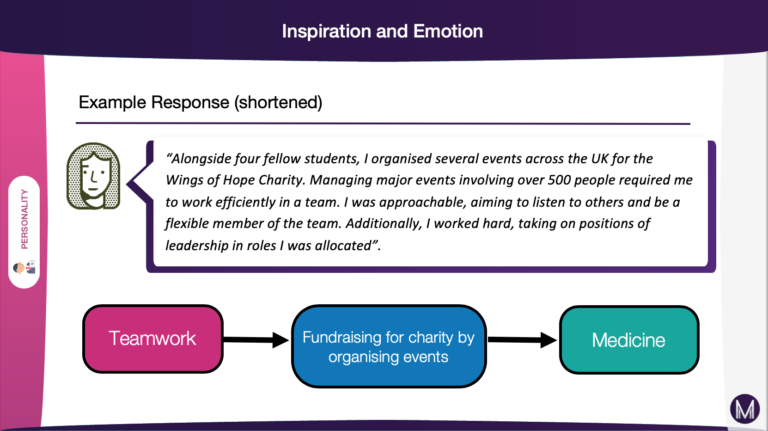
Lesson 3
Teamwork and Leadership
Being able to work in a team is an absolute must as a vet and we explore scenarios in which you have worked in a team. We will explore why this is important in a veterinary setting and tie in what you have learned in previous tutorials in motivation for veterinary medicine. As well as working in a team, you need to show clear leadership and explore examples of where you could have improved how you went about leading a team.
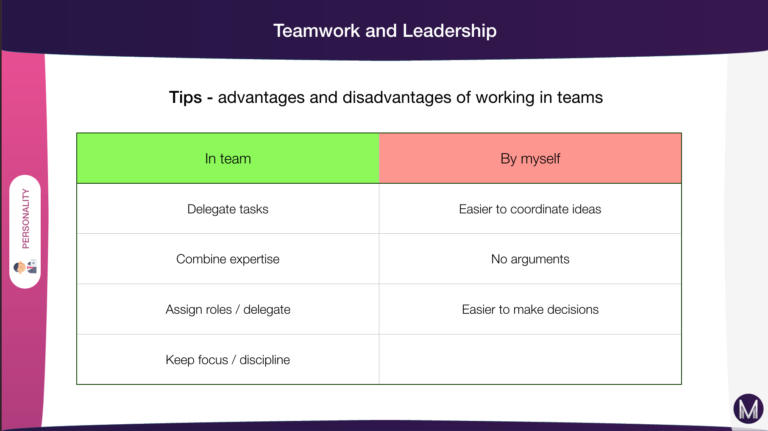
Lesson 4
Organisation & Time Management
Vet School can be a difficult time and universities want to make sure you’re able to cope with the pressure. They want to see how you organise yourself and manage your time. As well as motivation for veterinary medicine they want to see you have a life outside of being a vet and we will test you on possible questions involving stress and some of the difficulties faced by vet professionals – in particular starting veterinary surgeons.

Lesson 5
Personality Scenarios
After gaining all the knowledge so far, we will delve further by going through some scenarios which put you to the test. This involves a mixture of MMI and direct questioning. You will gain feedback on your progress so far and sit down with your tutor and identify areas you need to improve further.
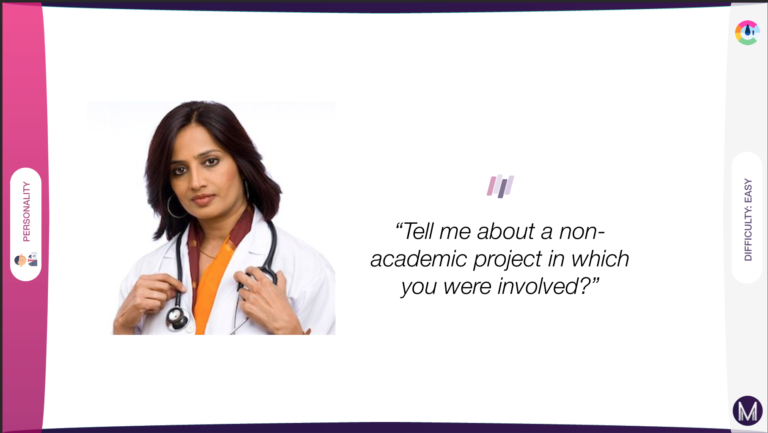
Lesson 6
Academia and Motivation
Commonly you will be asked about some wider reading you have done outside of veterinary medicine and why you chose the A-Levels you did. You may be probed on what you have gained from your experience in sixth form so far and how you want to carry this on further into vet school.
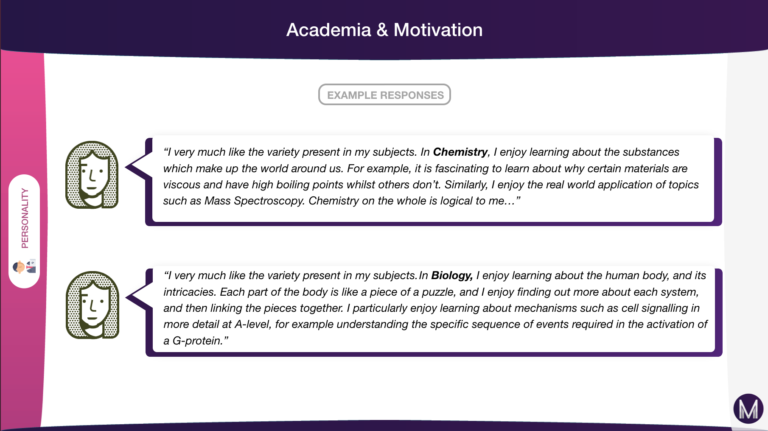
Lesson 7
Thinking Outside the Box
This is our most popular lesson! We help you tackle some of the most unpredictable scenarios and questions you might get. From being asked who you would invite to a dinner party to where you would travel in the world – these are actual stations that have come up at universities!
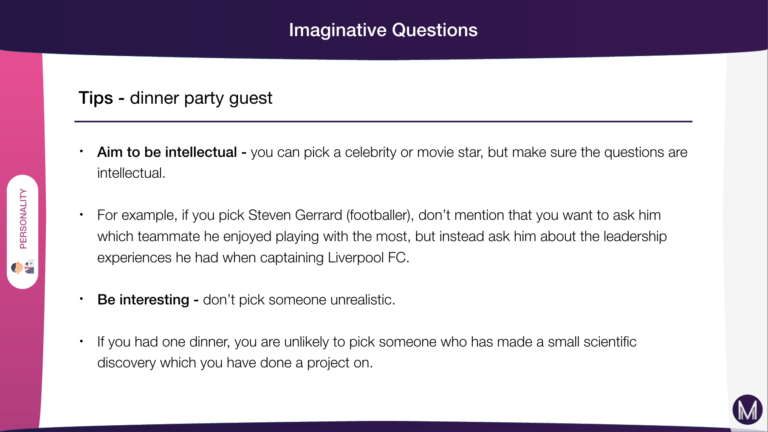
Lesson 8
MMI Practice 1
Let’s put our work to practice with real MMI scenarios. We will go through these together with you and show you step-by-step the best way of tackling them. The benefit here is the real insight you get from tutors who have been on the other side of the interview before!
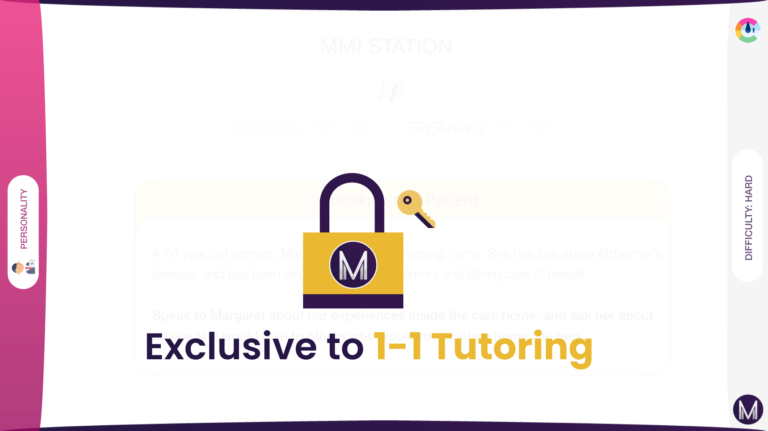
Lesson 9
MMI Practice 2
Let’s put our work to practice with real MMI scenarios. We will go through these together with you and show you step-by-step the best way of tackling them. The benefit here is the real insight you get from tutors who have been on the other side of the interview before!

Lesson 10
MMI Mini Mock 1
You’ll dive into the deep end with mocks! You’ll have a go at the station which we will record and then watch back together analysing areas you did really well and areas you need to work on!

Lesson 11
MMI Mini Mock 2
You’ll dive into the deep end with mocks! You’ll have a go at the station which we will record and then watch back together analysing areas you did really well and areas you need to work on!

Work Experience
It is quite likely you will get an MMI station which focuses on work experience and you need to be able to draw on what you have done and go beyond what you have already written on your personal statement. This is why we particularly focus on what you have written on your personal statement and ensure we’ve covered all possible questions you will get asked.
Tutorials
Lesson 1
Using STARR
Here we explore how to use the STARR framework when responding to questions on work experience. It’s important to be able to structure your questions well and using this structure helps us formulate answers which will impress the interviewers. In particular, we’ll look at good and bad answers before going through 10+ questions in the interview handbook.
Lesson 2
Work Experience Walkthrough
Here we will talk through how work experience MMI or panel interviews go. We will test you on your work experience and replicate the. sort of scenario you would expect in your veterinary interview.
Lesson 3
Work Experience in Small Animal Practice
Have you been at a placement in a small animal practice which is more clinic based? Then here we will practice the sorts of questions veterinary schools like asking about those in small animal practices.
Lesson 4
Work Experience in Large Animal Practice
Work experience in large animal practices are common e.g. in a stable, farm, kennel or rescue centre. Veterinary Schools are a big fan of these and want to know what experience you gained in difficult scenarios.
Lesson 5
MMI Practice 1
Let’s put our work to practice with real MMI scenarios. We will go through these together with you and show you step-by-step the best way of tackling them. The benefit here is the real insight you get from tutors who have been on the other side of the interview before!
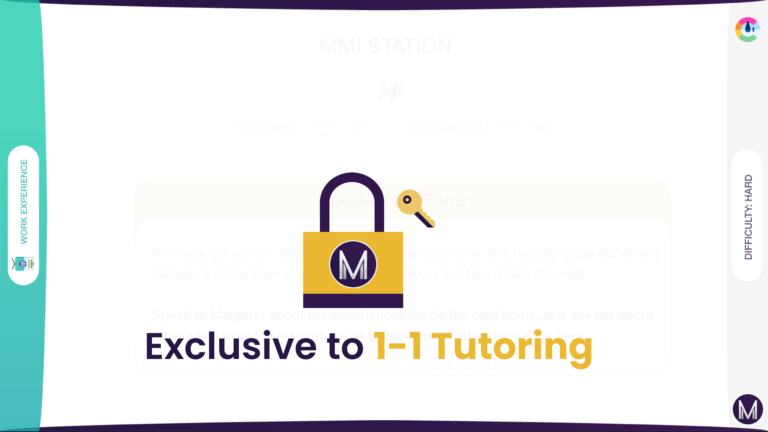
Lesson 6
MMI Practice 2
Let’s put our work to practice with real MMI scenarios. We will go through these together with you and show you step-by-step the best way of tackling them. The benefit here is the real insight you get from tutors who have been on the other side of the interview before!

Lesson 7
MMI Mini Mock 1
You’ll dive into the deep end with mocks! You’ll have a go at the station which we will record and then watch back together analysing areas you did really well and areas you need to work on!

Lesson 8
MMI Mini Mock 2
You’ll dive into the deep end with mocks! You’ll have a go at the station which we will record and then watch back together analysing areas you did really well and areas you need to work on!

Prioritisation
As a vet, it is inevitable that you will be very busy most of the time, often with multiple tasks to do at once. Therefore, it is essential that you are able to prioritise these tasks as to which is the most urgent/ needs to be done first, and often this is tested in MMI interviews.
Tutorials
Lesson 1
Prioritising: Introduction
Prioritisation is the process by which you decide which of a series of tasks is the most urgent and needs to be dealt with first. We will introduce this in the first lesson.
Lesson 2
Detailed Walkthrough of Prioritisation
There are many tasks as a vet that will most likely be on your daily list of things to do, and to an extent all of these are important. We will do a walkthrough of how to prioritise tasks.
Lesson 3
Prioritisation in a Group Setting
Some universities have group interviews which may test multiple MMI stations in one. You might be wondering how you can incorporate prioritisation into a group interview if you are having to communicate with people you do not know and are unaware of how importantly they prioritise things?
Lesson 4
MMI Practice 1
Let’s put our work to practice with real MMI scenarios. We will go through these together with you and show you step-by-step the best way of tackling them. The benefit here is the real insight you get from tutors who have been on the other side of the interview before!
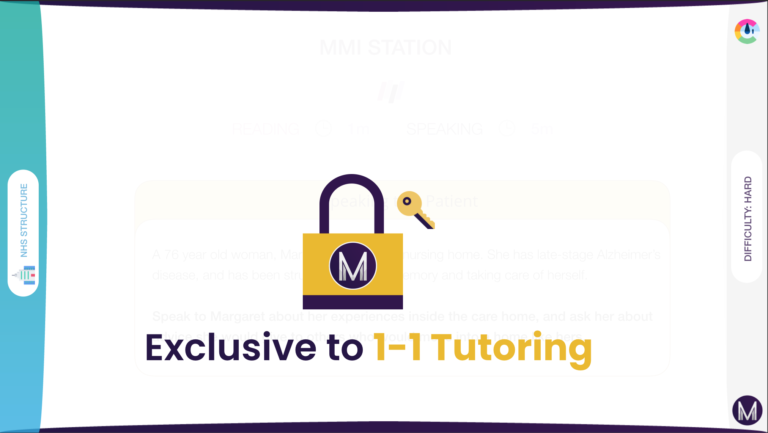
Lesson 5
MMI Practice 2
Let’s put our work to practice with real MMI scenarios. We will go through these together with you and show you step-by-step the best way of tackling them. The benefit here is the real insight you get from tutors who have been on the other side of the interview before!

Lesson 6
MMI Mini Mock 1
You’ll dive into the deep end with mocks! You’ll have a go at the station which we will record and then watch back together analysing areas you did really well and areas you need to work on!

Lesson 7
MMI Mini Mock 2
You’ll dive into the deep end with mocks! You’ll have a go at the station which we will record and then watch back together analysing areas you did really well and areas you need to work on!

Veterinary Ethics
In this section we tackle the hardest part of the interview – Veterinary Ethics. Veterinary ethics comprises a huge part of the degree, and a lot of this subject depends on your own views as often there is no ‘correct’ answer
Tutorials
Lesson 1
Veterinary Ethics: Introduction
This lesson aims to give you an introduction to the types of ethical issues that veterinarians face and to help you approach any questions you may be asked on ethics for your interview. Do not worry if you are faced with an ethical predicament that you have not seen before in an interview are unsure of.
Lesson 2
Justifying your Ethical Reasoning
The main focus of an ethical question when presented with one at an interview is not whether you gave the ‘correct’ answer, or whether the examiner agrees with what they believe to be true. What you are really being assessed on here is your ability to rationalise and justify a point, whilst giving a balanced argument.
Lesson 3
Veterinary Ethics Walkthrough
To help put some of the points we have discussed above into context, we will now run through an example of an ethical MMI station and how you can use what we have learnt above to approach this.
Lesson 4
MMI Practice 1
Let’s put our work to practice with real MMI scenarios. We will go through these together with you and show you step-by-step the best way of tackling them. The benefit here is the real insight you get from tutors who have been on the other side of the interview before!
Lesson 5
MMI Practice 2
Let’s put our work to practice with real MMI scenarios. We will go through these together with you and show you step-by-step the best way of tackling them. The benefit here is the real insight you get from tutors who have been on the other side of the interview before!
Lesson 6
MMI Mini-Mock 1
You’ll dive into the deep end with mocks! You’ll have a go at the station which we will record and then watch back together analysing areas you did really well and areas you need to work on!
Lesson 7
MMI Mini-Mock 2
You’ll dive into the deep end with mocks! You’ll have a go at the station which we will record and then watch back together analysing areas you did really well and areas you need to work on!
Anatomy
You may encounter an anatomy station during your MMI interview, and it can be easy to panic at the thought of having to name structures you have no idea about (after all, this is what you came to vet school to learn). The next few lessons will take you through how to tackle an anatomy question if you are faced with one, without requiring you to have swallowed a textbook.
Tutorials
Lesson 1
Using problem solving to solve anatomy questions
Here, we will give a list of questions that you can use when revising for interviews to help you solve anatomy stations.
Lesson 2
Top tips for anatomy stations
You will gain tips from the experts in veterinary medicine interview about how to approach anatomy stations – Remember they’re not necessarily testing your anatomical knowledge but rather how you can tackle situations where you may not know the right answer.
Lesson 3
Anatomy MMI Station Walkthrough
We will discuss how to show the examiner you have a logical methodical way of thinking to help you deduce what the structure may be.
Lesson 4
Anatomy MMI Station Practice 1
We will practice an example of the sort of MMI station you would get on veterinary medicine.
Lesson 5
Anatomy MMI Station Practice 2
We will practice an example of the sort of MMI station you would get on veterinary medicine.
Lesson 6
Anatomy MMI Station Practice 3
We will practice an example of the sort of MMI station you would get on veterinary medicine.
Choose your Interview plan, we’re flexible
- Tailored Timeline: 1 week, 1 month or 1 year - we’ve got you covered
- Personalised Structure: pick and choose the tutorials you want
- Flexible Financing: 0% interest instalment plans available
- Affordable Alternatives: 5, 10, 15 hour schemes
All hours booked can be used flexibly between UCAT, BMAT, Interview, UCAS, GCSE and A-level over the next 15 months and shared between friends and family.
Average 1.3x improvement in 30 minutes
Uni-Specific Feedback
Trusted by 12,000 customers











